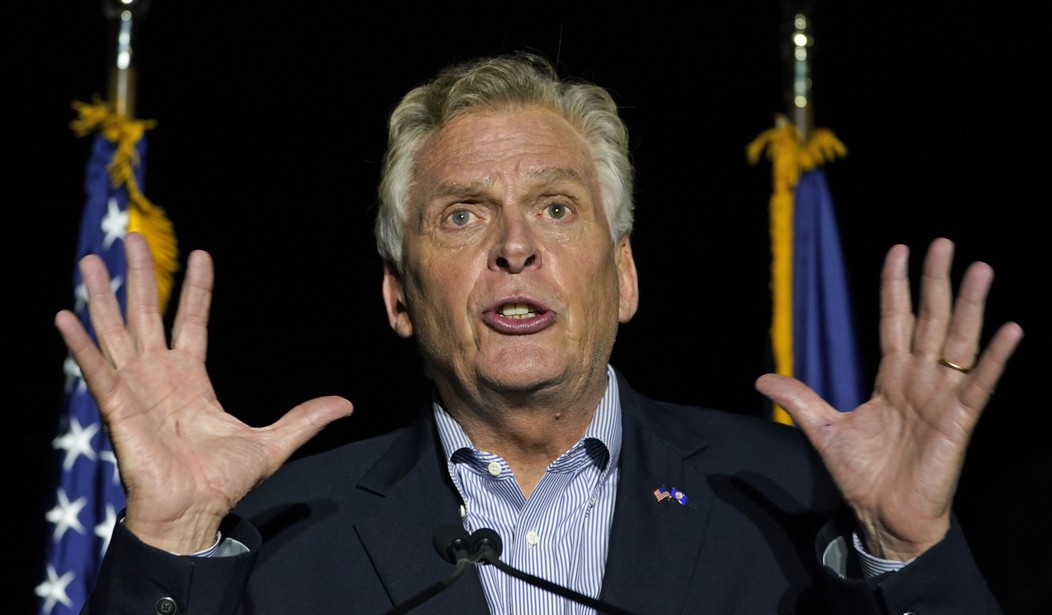Spoiler alert: The answer is yeah, probably, but it’s also not terribly novel. Fox News certainly appears delighted to report on Terry McAuliffe’s social-media sleight-of-hand, though, and for good reason. It’s still a pretty tasty lead in the final days of a tight race:
Former Gov. Terry McAuliffe has spent nearly $100,000 advertising “fake news” websites on Facebook during the Virginia gubernatorial campaign, Fox News can reveal.
The Democrat’s advertisements, which have been viewed up to 3.5 million times so far, are hidden on a Facebook page with a similar name to a local news website. The ads link to third-party websites that ostensibly publish local news, but exist to promote Democratic candidates. The websites have been widely described as disinformation and “partisan propaganda.”
In the first place, $100K in this high-profile race is barely a drop in the bucket. According to the latest financial reports, Glenn Youngkin’s campaign has a $6 million advantage over McAuliffe. The two put together have raised a whopping $117 million for this gubernatorial race, including $20 million out of Youngkin’s own pocket. In the first three weeks of this month, McAuliffe spent almost $19 million alone, while Youngkin spent $11 million.
At this level, a hundred grand is what you hand an intern and tell him to do something different.
That’s precisely what this scheme looks like, too:
Like most candidates, McAuliffe operates a Facebook page under his own name to promote his campaign. But the former governor also operates another Facebook page that blurs the lines between a political campaign and disinformation.
The page is called “The Download Virginia,” and it was quietly launched by McAuliffe in June. While the name of the page sounds similar to that of a news organization, the page has not published any posts or photos, and only 67 people have “liked” the page (a term Facebook uses to describe followers).
Instead, most voters who have encountered “The Download” have done so through paid advertising. The ads do not appear on the page itself but can be obtained through a Facebook Ad Library Report, a tool used by journalists and researchers. The McAuliffe campaign has spent $471,044 on ads distributed by this page since June. With several ads running at time of publication, that number is likely to rise before election day.
The advertisements generally contain a comment and a link to a mainstream news article that covers the campaign favorably. But sprinkled among the links to legitimate media are seven separate advertisements (and dozens of variations) that promote websites widely considered to be “fake news”.
Is that a bit sleazy? Sure, but this isn’t the first campaign to produce “fake news.” Those who are unfortunate enough to get on campaign mailing lists see this from time to time as well. It’s laughably threadbare on credibility, but at some point campaigns eventually treat it like the Cold War superpowers treated missile gaps — something that had to be answered whether it made a whit of difference to mutually assured destruction or not.
Besides, who is the target audience here? People who come to McAuliffe’s Facebook page? Those aren’t likely to be anyone other than already-die-hard McAuliffe supporters, and even they probably figure out almost immediately that the “news” articles are set-ups for fundraising. Getting 3.5 million clicks out of $100,000 might get the intern a nice commendation, but that is the limit of the impact on the race.
Of course, it does paint McAuliffe as a sleazy candidate willing to traffic in falsehoods in order to win an election. But … we knew that already, no? McAuliffe’s other such sin are much more significant than this silly campaign operation, even if it’s fun to pull it apart.







Join the conversation as a VIP Member